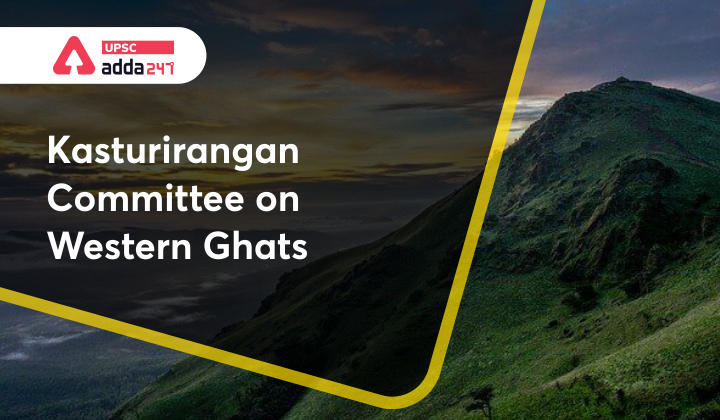Table of Contents
Kasturirangan Committee on Western Ghats: Relevance
- GS 3: Conservation, environmental pollution and degradation, environmental impact assessment.
Kasturirangan Committee on Western Ghats: Context
- Recently, Karnataka Chief Minister has informed the Centre that the state is opposed to the Kasturirangan Committee report on Western Ghats.
Kasturirangan Committee on Western Ghats: Key points
- The Chief Minister has said that declaring Western Ghats as ecologically sensitive zone would adversely affect the livelihood of people in the region.
- The experts, on the other hand, called the state’s opposition disastrous for the ecologically fragile Western Ghats.
Kasturirangan committee recommendations
- The Kasturirangan committee report proposes 37 per cent of the total area of Western Ghats to be declared as eco-sensitive area (ESA).
- 37% of western ghats roughly makes 60,000 square kilometres of the total area.
- Out of this, more than 20,000 sq km of the area falls in Karnataka.
- The report recommended a blanket ban on mining, quarrying, setting up of red category industries and thermal power projects.
- The committee also advocated that the impact of infrastructural projects on the forest and wildlife should be studied before permission is given for these activities.
- Moreover, the committee was of the opinion that the UNESCO Heritage tag is an opportunity to build global and domestic recognition of the enormous natural wealth that exists in the Western Ghats.
- The 39 sites are located across the Western Ghats and distributed across the states (Kerala 19), Karnataka (10), Tamil Nadu (6) and Maharashtra (4).
- The boundary of the sites, are in most cases, boundaries of the legally demarcated national parks, wildlife sanctuaries, tiger reserves and forest divisions and therefore, already accorded with high level of protection.
- The Eco-Sensitive Area mapping and demarcation done by the committee also indicates that all sites are within this area.
- The state governments should view this development and build a plan to protect, conserve and value the resources and opportunities of the region.
- The state of Karnataka has the highest percentage of the ESA– 46.50 per cent.
Kasturirangan Committee on Western Ghats: Why the successive governments have rejected the report?
- The state government believes that implementation of the report will halt the developmental activities in the region.
- The state government was of the opinion that the Kasturirangan report has been prepared based on the satellite images, but the ground reality is different. People of the region have adopted agriculture and horticultural activities in an eco-friendly manner.
- Also, priority has been accorded for environment protection under the Forest Protection Act.
- So, in this background, bringing one more law that would affect the livelihood of the local people is not appropriate.
- Moreover, the political representatives from Uttara Kannada district have always opposed the Kasturirangan report since more than 600 villages will fall under the eco-sensitive area if the report is implemented.
Kasturirangan Committee on Western Ghats: Impacts due to non-implementation of the report
- Dr TV Ramachandra, a professor of Indian Institute of Science (IISc), said that climate change is causing irreversible damage through events like recurring floods, droughts, landslides, etc.
- These events are affecting the livelihood of all people (irrespective of poor or rich) and hurting the nation’s economy.
- In such a situation, it is better to conserve the fragile ecosystems that costs less rather than spending money /resources for restoration / rejuvenation.
- Wildlife conservationist Joseph Hoover said that if the government truly cares for the welfare of 22 crore people who are sustained by the Western Ghats, it would accept at least 85 per cent of the recommendations of the Kasturirangan Committee. Else, it would be the reason for the sufferings of the people.
Kasturirangan Committee on Western Ghats: Deemed forests in Karnataka
- The planning of state government to further shrink the deemed forest area from 3,30,186 hectares to 2 lakh hectares has further aggravated the concerns over the forest encroachments in Karnataka.
- The state expert committee in 1997 had identified 10 lakh hectares of deemed forest area which over the years were shrunk by the successive governments.
Also Read:





 TSPSC Group 1 Question Paper 2024, Downl...
TSPSC Group 1 Question Paper 2024, Downl...
 TSPSC Group 1 Answer key 2024 Out, Downl...
TSPSC Group 1 Answer key 2024 Out, Downl...
 UPSC Prelims 2024 Question Paper, Downlo...
UPSC Prelims 2024 Question Paper, Downlo...
